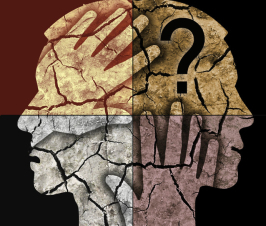People taken ill by coronavirus infections may experience psychiatric problems while hospitalized and potentially after they recover, suggests an analysis of past research led by the UCL Institute of Mental Health with King’s College London collaborators.
Coronavirus infections and the psychiatric connections
The systematic review paper, published in The Lancet Psychiatry, compiled results from short- and long-term studies of people hospitalized by recent coronaviruses, namely SARS (Severe acute respiratory syndrome) in 2002-2004, MERS (Middle East respiratory syndrome) in 2012, as well as COVID-19 this year.
COVID-19 is caused by the SARS-CoV-2 virus
COVID-19 is caused by the SARS-CoV-2 virus, a type of coronavirus. Some coronaviruses only cause mild symptoms of the common cold, but SARS-CoV-2 can cause severe respiratory illness, as did SARS-CoV-1 (the virus implicated in the 2002-2004 SARS epidemic) and MERS-CoV, which caused MERS in 2012.
The analysis found that one in four people hospitalized with COVID-19 may experience delirium during their illness, a known problem among hospital patients, which can increase risk of death or extend time in hospital.
Post-recovery effects of COVID-19 are unknown so results are based on SARS and MERS studies
The post-recovery effects of COVID-19 are not yet known, so long-term risks such as post-traumatic stress disorder (PTSD), chronic fatigue, depression, and anxiety are based on SARS and MERS studies, which may or may not apply to COVID-19 as well.
Co-lead author Dr Jonathan Rogers (UCL Psychiatry and South London and Maudsley NHS Foundation Trust) said: “Most people with COVID-19 will not develop any mental health problems, even among those with severe cases requiring hospitalization, but given the huge numbers of people getting sick, the global impact on mental health could be considerable.
“Our analysis focuses on potential mental health risks of being hospitalized with a coronavirus infection, and how psychiatric conditions could worsen the prognosis or hold people back from returning to their normal lives after recovering.”
Authors of the new paper analyzed 65 peer-reviewed studies and seven recent pre-prints
The authors of the new paper analysed 65 peer-reviewed studies and seven recent pre-prints that are awaiting peer review, which included data from over 3,500 people who have had one of the three related illnesses. The review only included results from people who were hospitalized, and not people with more mild cases. The findings cover both acute symptoms during the illness, and long-term outcomes from two months to 12 years.
Findings cover both acute symptoms during the illness, and long-term outcomes
Almost one in three people hospitalized with SARS or MERS went on to develop PTSD, at an average follow-up time of almost three years, especially if they had ongoing physical health problems. Rates of depression and anxiety were also high, at roughly 15% one year or longer after the illness, with a further 15% also experiencing some symptoms of depression and anxiety without a clinical diagnosis. More than 15% also experienced chronic fatigue, mood swings, sleep disorder or impaired concentration and memory.
Some preliminary evidence found that delirium may have been associated with raised mortality during the MERS outbreak
While in hospital, a significant minority of people with coronavirus infections experienced delirium symptoms such as confusion, agitation and altered consciousness. Almost 28% of people hospitalized for SARS and MERS experienced confusion, and early evidence from the ongoing pandemic suggests that delirium could be similarly common in COVID-19 patients. The authors found some preliminary evidence that delirium may have been associated with raised mortality during the MERS outbreak.
Co-lead author Dr Edward Chesney (Institute of Psychiatry, Psychology & Neuroscience, King’s College London and South London and Maudsley NHS Foundation Trust) said: “We need more research on how to prevent mental health problems in the long term. One possibility might be to reduce social isolation by allowing patients to communicate with their loved ones by using video links.”
Some of the risk factors associated with worse mental health outcomes identified
The body of research also identified some of the risk factors associated with worse mental health outcomes. Researchers found that worrying a lot about the illness was associated with worse mental health in the long run, and healthcare workers had worse long-term mental health outcomes than other groups, while making a good physical recovery predicted better long-term mental health.
‘To avoid a large-scale mental health crisis’, senior authors suggests the following
Senior author Professor Anthony David (UCL Institute of Mental Health) said: “To avoid a large-scale mental health crisis, we hope that people who have been hospitalized with COVID-19 will be offered support, and monitored after they recover to ensure they do not develop mental illnesses, and are able to access treatment if needed.
“While most people with COVID-19 will recover without experiencing mental illness, we need to research which factors may contribute to enduring mental health problems, and develop interventions to prevent and treat them.”
The research was supported by Wellcome, the National Institute for Health Research, and the Medical Research Council.
1. Jonathan P Rogers, Edward Chesney, Dominic Oliver, Thomas A Pollak, Philip McGuire, Paolo Fusar-Poli, Michael S Zandi, Glyn Lewis, Anthony S David. Psychiatric and neuropsychiatric presentations associated with severe coronavirus infections: a systematic review and meta-analysis with comparison to the COVID-19 pandemic. The Lancet Psychiatry, 2020; DOI: 10.1016/S2215-0366(20)30203-0

Razi Berry is the founder and publisher of the journal Naturopathic Doctor News & Review, which has been in print since 2005, and the premier consumer-faced website of naturopathic medicine, NaturalPath. She is the host of The Love is Medicine Project docuseries, The Natural Cancer Prevention Summit, The Heart Revolution-Heal, Empower and Follow Your Heart, and the popular 10-week Sugar Free Summer program. From a near death experience as a young girl that healed her failing heart, to later overcoming infertility and chronic fatigue syndrome and fibromyalgia through naturopathic medicine, Razi has lived the mind/body healing paradigm. Her projects uniquely capture the tradition and philosophy of naturopathy: The healing power of nature, the vital life force in every living thing and the undeniable role that science and mind/body medicine have in creating health and overcoming dis-ease. You can follow Razi on social media: Facebook at Razi Berry, Instagram at Razi.Berry and join the Love is Medicine group to explore the convergence of love and health. Look for more, and listen to more Love is Medicine podcast episodes here.

















